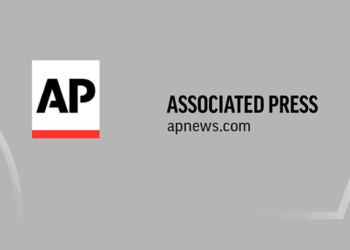BRUSSELS ― The leaders of France, Germany and Poland are converging Wednesday on tiny Moldova to urge voters to keep turning away from Russia and support their country’s pro-EU government.
The Moldovan president, Maia Sandu, and her governing Party of Action and Solidarity (PAS) face a critical Sept. 28 parliamentary election amid warnings that the Kremlin is working to influence the result and derail the country’s efforts to join the EU.
“There are those who will try to lead us astray. They have tried before … But the Moldovan people know what is best for them,” Sandu is expected to say Wednesday at a rally marking the country’s independence day.
“For our country, the best choice is to stand alongside France, Germany, Poland and the other nations of our continent in the great family of peace — the European Union.”
A country of 2.4 million people sandwiched between Romania and Ukraine, Moldova has become a target for Russian President Vladimir Putin. While Moscow fights a physical war to subjugate Ukraine, it is using using hybrid tactics to try to control Moldova, including large-scale election manipulation of voters.
This week’s visit by French President Emmanuel Macron, German Chancellor Friedrich Merz and Polish Prime Minister Donald Tusk is designed to help keep Moldova on a path toward EU membership, and to remind voters there’s an alternative to Russia.
“This is not just a visit, but a living connection between Europe and the Moldovan people,” said Jürgen Hardt, foreign policy spokesperson for Germany’s ruling CDU party. “Never again will one of our allies stand alone in the face of Russian aggression.”
Last year, Sandu secured a second term in office by a razor-thin margin following an election marred by vote-rigging, including a scheme that saw voters paid to back her Kremlin-friendly opponents. A simultaneous referendum on EU membership passed by a margin of 50.4 percent to 49.6 percent.
In both cases, the votes of the 250,000 Moldovans who live abroad, many in EU countries, formed a key pillar of the liberal government’s support. Earlier this month, Moldova’s National Security Adviser Stanislav Secrieru warned fears were growing over disinformation aimed at the diaspora and even of possible disruptions at polling stations abroad.
“Under normal circumstances, this election campaign should be very favorable to the incumbents. Opinion polls show that, as of today, we would almost have a majority,” said Nicu Popescu, Moldova’s former deputy minister who is running as a PAS parliamentary candidate.
“But of course there are hybrid attacks, there’s non-digital aggression, you have Russia smuggling in millions and millions in cash to buy votes on a very large scale. So, while I’m confident, every vote will matter.”
Getting in
In Chisinau, Merz, Macron and Tusk will want to signal to Moldovan voters that their country’s future lies with the EU.
Their presence “sends a powerful message ― Moldova is not alone,” said Siegfried Mureșan, a Romanian MEP and chair of the European Parliament’s delegation to the country. “Its European path is real, irreversible, and backed by all major political families in the EU.”
However, the exact timing of when Moldova joins the EU — and takes a crucial step known as opening a negotiating “cluster” — remains controversial. Earlier in the summer, EU officials and diplomats told POLITICO the bloc was considering fast-tracking Moldova’s bid by opening a negotiating cluster before the election to spur the pro-EU camp.
But Ukraine and many of its allies are deeply opposed to such a move. And the fact that U.S. President Donald Trump has now prevailed on Hungarian Prime Minister Viktor Orbán — who opposes Ukraine’s EU membership, but has indicated he would support that of Moldova — to lift his hold on Kyiv’s joining the bloc has changed the dynamic, one diplomat said.
“It’s understandable that some people want to offer Moldova a negotiating cluster, but to do this because there is an election coming would be short-sighted and, ultimately, counter-productive,” the diplomat said. “Other countries are watching.”
A French official said: “There are merits for both the candidacies of Ukraine and Moldova, in the context of what Ukraine is going through. The decisions in Brussels have to be taken unanimously and we need to operate within these … principles.”
Decisions will be taken in the “coming days or weeks,” the official added. Two diplomats also expressed hope that the deadlock over Ukraine’s accession could be broken in the coming months, given the pressure on Budapest.
The presence of Poland’s Tusk, whose country only joined the EU in 2004, is particularly significant. As a former Warsaw Pact member that has enjoyed a stunning rise to prosperity since then, Poland stands out as an example for Moldova of how it could benefit from EU membership.
According to Popescu, the former foreign minister, European countries have their own reasons to care about the result.
“If Russia succeeds in Ukraine, succeeds in Moldova, it will pose a direct military threat to countries like Romania and Poland — and people understand the stakes. That’s why we have this signal of support that Moldova matters.”
Clea Caulcutt in Paris contributed reporting.
The post European heavyweights come out in force to urge Moldovans to snub Putin appeared first on Politico.




